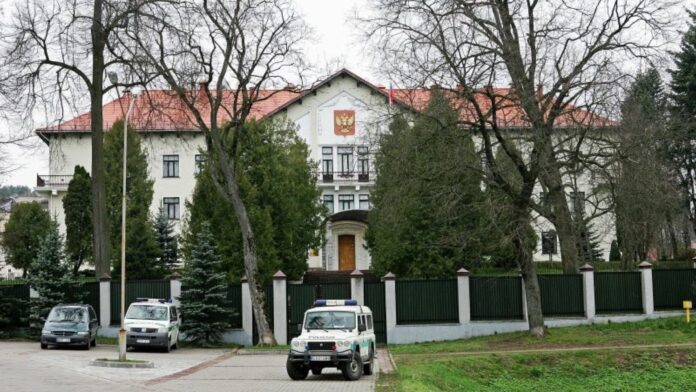
On February 12, the Russian government summoned Lithuanian, Latvian, and Estonian envoys to accuse them of trying to sabotage next month’s Russian presidential election. Moscow accuses Estonia, Latvia, and Lithuania of ignoring Russia’s requests to ensure the security of polling stations in its embassies.
Moscow demanded that the Baltic States “take all necessary measures” to ensure the security of Russian embassies and voters. “Creating difficulties in the conduct of elections would cause serious protest among Russian citizens living in these countries,” it warned. “In the event of continued sabotage, we will act decisively in a bilateral context and international structures.”
Responding to Moscow’s statements, the Lithuanian Ministry of Foreign Affairs called the accusations bizarre. “It is not for the Kremlin to explain and lecture democratic countries about elections,” said Paulina Levickytė, spokeswoman for the foreign minister.
“We take the view that Russia’s decision to organise so-called elections on dates almost coinciding with the Crimea annexation [anniversary], and to organise them in the temporarily occupied or illegally annexed territories of Ukraine, is an illegal and deliberate provocation by the Russian Federation,” Levickytė said. Lithuania does not and will not recognize voting or election results in the occupied or illegally annexed territories of Ukraine.
“The Russian political leadership and others involved in organising these elections will face the consequences of these illegal actions. This illegal step is yet another desperate attempt by the Kremlin to legitimise its control over the temporarily occupied territories of Ukraine, to give it the illusion of absent legitimacy, to continue its flagrant violation of international law and of Ukraine’s independence, territorial integrity and sovereignty, and to add to the long list of crimes committed by Russia in Ukraine,” said Levickytė. Lithuania is firmly committed to supporting Ukraine and its territorial integrity, she added. “Crimea, Kherson, Zaporizhzhia, Donetsk, and Luhansk are Ukraine,” she stressed.
In response to Moscow’s demands to ensure the security of Russian embassies and voters in the Baltic states, the foreign ministry spokesperson noted that Lithuania respects and will continue to respect international law and its international obligations. “However, the responsibility for the consequences of a possible provocation lies with the Russian Federation,” she added.
On February 13, Russian independent news website Mediazona reported that Russia has placed Lithuanian Culture Minister Simonas Kairys, Klaipėda Mayor Arvydas Vaitkus, and several dozen other Lithuanian politicians and public figures on its wanted list. Mediazona says it has collated publicly available information on wanted persons – almost 100,000 wanted notices – from the Russian Interior Ministry’s database.
It has emerged that Russia has announced a “search” for 29 Lithuanian citizens linked to the dismantling of Soviet monuments including six Vilnius city council deputies and Lithuanian Culture Minister Simonas Kairys. Estonian Prime Minister Kaja Kallas is included in the wanted database. It also featured former Latvian Interior Minister Marija Golubeva, 67 Latvian MPs, 15 members of the Riga City Council, and others.
The database does not indicate under which legal article the search was declared. However, the Kremlin announced that it had placed Estonian prime minister and other Baltic officials on the wanted list for hostile actions against Moscow – “against historical memory and our country,” according to Kremlin spokesman Dmitry Peskov.
The Lithuanian culture minister says that Russia is continuing to fight against democracy and human rights. In his view, culture, heritage, and memory are also a war zone in which imperialism pursues its own goals. “My duty as culture minister is to prevent the achievement of these malicious goals, to prevent the distortion of these themes both in Lithuania and in the international arena.”
Last year, the desovietization law came into force in Lithuania prohibiting the promotion of totalitarian and authoritarian regimes and their ideologies in public spaces. As a result, the removal of symbols of totalitarianism and authoritarianism – monuments, street names, square names, and other symbols began.



























